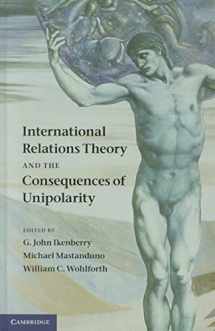
International Relations Theory and the Consequences of Unipolarity
Book details
Summary
Description
The end of the Cold War and subsequent dissolution of the Soviet Union resulted in a new unipolar international system that presented fresh challenges to international relations theory. Since the Enlightenment, scholars have speculated that patterns of cooperation and conflict might be systematically related to the manner in which power is distributed among states. Most of what we know about this relationship, however, is based on European experiences between the seventeenth and twentieth centuries, when five or more powerful states dominated international relations, and the latter twentieth century, when two superpowers did so. Building on a highly successful special issue of the leading journal World Politics, this book seeks to determine whether what we think we know about power and patterns of state behavior applies to the current 'unipolar' setting and, if not, how core theoretical propositions about interstate interactions need to be revised.


We would LOVE it if you could help us and other readers by reviewing the book
Book review



